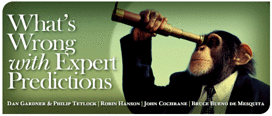I’m happy to learn that Bruce Bueno de Mesquita has made specific predictions in some of his publications, and has participated in some forecasting competitions. He deserves praise for being forthright in this way.
But the specific issue was the relative accuracy of foxes and hedgehogs, and my claim was about “open competitions giving a wide range of foxes a chance to show they could achieve comparable accuracy.” Tetlock’s study met this standard, but “a competition … in which approximately six different quantitative approaches to forecasting were applied” does not—mostly likely all were hedgehog approaches. “An observable track record in journal publications” also does not meet that standard, unless it is plausible that diverse foxes with access to acceptable publication forums could know sufficiently in advance on what topics and at what times to make their forecasts, in order to be comparable to De Mesquita’s.

